Mac notebook and other portable computing is covered in The 'Book Review. iPad, iPod, iPhone, and
Apple TV news is covered in iOS News
Review. Older Macs are covered in Vintage Mac News. All prices are in US
dollars unless otherwise noted.
Purchases made through links to Amazon.com and
Apple's iTunes/iBook/App/Mac App Store support Low End Mac.
News & Opinion
Apple Updates
Tech Trends
News & Opinion
Mac mini Supply Drying Up, Could Portend an Ivy
Bridge Update
AppleInsider Staff report:
 "With the Mac
mini still waiting for an update to Intel's latest Ivy Bridge chips,
supply of the diminutive desktop has begun to dwindle at various
resellers....
"With the Mac
mini still waiting for an update to Intel's latest Ivy Bridge chips,
supply of the diminutive desktop has begun to dwindle at various
resellers....
"In addition, Macerkopf.de noted on Monday that supply of the Mac
mini has also begun to run dry in Germany. Apple typically winds down
its inventory ahead of a new product launch, and limited supply at
third-party resellers is often one of the first signs that a hardware
refresh is forthcoming.
"A reasonable deduction, and the Mac mini is overdue for an upgrade
to Ivy Bridge silicon, since it's 14 months since it was last
refreshed."
Link: Mac mini Supply
Drying Up, Could Signal Ivy Bridge Update
Upgrading a 2006 Mac mini to 2007 Firmware in Order
to Add More RAM
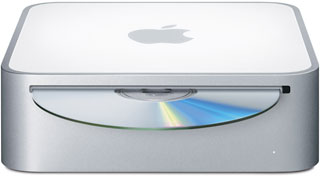 netkas.org
forum contributor Shinso has posted a detailed tutorial on upgrading
older Mac mini firmware in order to support up to 4 GB of RAM
instead of what appears to be an arbitrary 2 GB ceiling imposed by
Apple. Upgrading the firmware should also enable these older minis to
run OS X 10.7 Lion.
netkas.org
forum contributor Shinso has posted a detailed tutorial on upgrading
older Mac mini firmware in order to support up to 4 GB of RAM
instead of what appears to be an arbitrary 2 GB ceiling imposed by
Apple. Upgrading the firmware should also enable these older minis to
run OS X 10.7 Lion.
Shinso notes that risk should be minimal in making this upgrade,
since the hardware is essentially the same between the 2006 and 2007
Mac minis except that the 2007
Mac mini has a Core 2 Duo Processor whereas the 2006 has a Core Duo
processor. Consequently, you will need to find and install a Core 2 Duo
Processor in order to do this upgrade. Shinso recommends the T7600
SL9SD 2.33 GHz Core 2 Duo processor, which he says are selling on
eBay for about $6. Installation is
tricky but not difficult, and you should read some guides that are
floating around on the Internet in order to do it without much hassle
and watch a YouTube video or two. Links are provided in the
article.
You should also have the latest EFI firmware update for
your Mac mini. First check to ensure your EFI is
the latest.
Shinso observes: "The fact that Apple blatantly disabled our
computers from running OS X Lion is evidence of Apple's 'planned
obsolescence' model which forces users to upgrade every 2-3 years as
clearly demonstrated by the latest version of OS X, 'Mountain Lion'. Several
computers that are more than adequate to handle OS X Mountain Lion
(even computers going back only two years ago) haven't been allowed
because Apple didn't want to give support for those graphics cards.
Apple's used to be very upgradable, and now everything is soldered onto
the boards so you can't upgrade these newer computers.
Publisher's note: Although you can install 4 GB of memory in the
2007 Mac mini, it will only recognize 3 GB, as noted by Other World
Computing. That said, 2-3 GB of RAM will unleash the power of any Mac
mini currently operating with only 512 MB or 1 GB of installed
memory.
As for Apple "blatantly" disabling early Intel Macs from running
Lion, the reality is that in early 2006, Apple didn't have the option
of using Intel's Core 2 Duo CPUs, as they were not yet on the market,
and Lion was specifically designed to take advantage of Core 2 Duo
processors, which support 64-bit operation that Core Duo does not
support. OS X 10.8 Mountain Lion is a 64-bit only operating system
and does not include support for the integrated graphics found in many
early Macs, including the 2007 Mac mini. All that said, OS X 10.7
Lion arrived in 2011, five years after the Core Duo Mac mini first
shipped, and Mountain Lion in 2012, five years after the first Core 2
Duo Mac mini arrived - much more than the "2-3 years" Shinso complains
about. dk
Link: Simple Guide on
Upgrading a 2006 Mac mini Firmware to 2007 Mac mini Firmware in Order
to Add Up to 4 GB of RAM
Best Mac Anti-Virus Software - and Why You Need
It
PR: Mac users can often be heard to say "I don't need
antivirus software, I have an Apple". Unfortunately, this is a
misguided conclusion. Whilst the dangers are certainly much less than
with Windows computers, they do exist nonetheless. If nothing else, the
recent spread of Mac Trojans proves this. Mac users who think they do
not need to concern themselves have created an illusion. The claim that
Apple users are less threatened than Windows users is currently still
correct, but could change rapidly. It was the low market share of Macs
that limited the attentions of online criminals; now that Macs are
becoming more popular, this state of affairs is changing. Something
that many people forget is that phishing works equally well on any
device with an integrated browser, regardless of whether this is
Windows, Mac, Apple TV, Android, Symbian or Internet TV; phishing
affects everyone equally.
Link: Mac Reviews /
Tests
Mountain Lion the Most Annoying OS Since Windows
98?
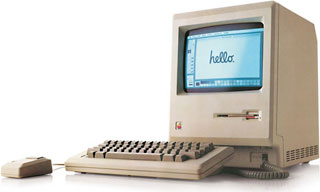 Motley Fool
blogger Malcolm Manness says he's been an Apple fan for many years, and
a Mac user since the
very first 128K model. He notes that as a rule, Mac OS/OS X system
upgrades over the years have proceeded smoothly, but the transition to
OS X 10.8 Mountain Lion has been terrible - unlike anything he's ever
experienced with a Mac OS upgrade. In his estimation, this is the most
painful OS experience since he last worked on Microsoft Windows 98.
Motley Fool
blogger Malcolm Manness says he's been an Apple fan for many years, and
a Mac user since the
very first 128K model. He notes that as a rule, Mac OS/OS X system
upgrades over the years have proceeded smoothly, but the transition to
OS X 10.8 Mountain Lion has been terrible - unlike anything he's ever
experienced with a Mac OS upgrade. In his estimation, this is the most
painful OS experience since he last worked on Microsoft Windows 98.
Manness acknowledges that some of his problems derive from the fact
that he's a power user, on his computer 8-20 hours per day writing,
researching, photo editing with LightRoom and Photoshop, Bento
Database, HTML editing, and occasional sound and video editing,
typically with three browsers running.
For example, he says most users don't have the number of email
accounts he does or the need to create pub files from word processing
documents, likely making the memory management issues he's encountered
with Mountain Lion less relevant, but for him, updating the Mail
program, which apparently has a different database than before and thus
needs to convert all your old emails and folders, took three days on
his machine, during which the Mail program monopolized enormous amounts
of CPU time and the computer slowed to a crawl for hours.
And that was just for starters. Similar issues with iPhoto, which he
declares now unusable.
Also issues with the Finder, iCloud, and Safari, and Manness says
his best advice is to download the free app
Free Memory (or better
the 99¢ pro version) that allows you to constantly monitor
memory status and to clear the memory heap somewhat.
Link: Apple Mt. Lion -
Most Annoying OS Release Since Win98? Part I
Link: Apple Mt. Lion - Most Annoying OS
Release Since Win98? Part II
Firefox to Drop Support for OS X 10.5 Leopard on
November 20
Mozilla.org blogger Alex Keybl says Firefox will end support for
users running Mac OS X 10.5
Leopard on November 20th, 2012. After this date, users will stop
receiving Firefox updates, including new features and security fixes.
If you are a Mac OS X 10.5 user and would like to continue to use the
latest Firefox, you will be obliged to upgrade to a computer running
Mac OS X 10.6 or later, and barring any major stability or security
issues found over the next few weeks, Firefox 16.0 will be the last
release to support 10.5.
Publisher's note: Firefox 4 dropped support for PowerPC Macs, but
you don't have to feel too left behind. TenFourFox, a port
of Firefox 10 for PowerPC Macs (with an unstable development version of
Firefox 17 as well), continues to run on OS X 10.4 Tiger and 10.5 Leopard, and
AuroraFox ports
Firefox 17 to PPC Macs running Leopard.
Perhaps someone will pick up the ball and continue to port Firefox
to OS X 10.5 on Intel. According to our site logs, 6.3% of visitors in
the past month are using OS X 10.4 on PowerPC, 6.2% 10.5 on PPC, and
5.8% 10.5 on Intel, so the market is roughly as large as that for
AuroraFox, which is currently my favorite PPC port of Firefox.
dk
Link: We Bid You Adieu, Spotted
Cat
Apple Updates
Apple Releases OS X Mountain Lion 10.8.2
Supplemental Update
The OS X Mountain Lion 10.8.2 Supplemental Update is recommended for
all users running OS X Mountain Lion v10.8.2 and includes the following
fixes:
- Resolves an issue that may cause certain Japanese characters to
appear incorrectly in Mail
- Allows Safari to access secure sites when parental controls are
enabled
- Addresses an issue that may prevent systems with more than 64 GB of
RAM from starting up
- Resolves an issue that may cause DVD Player to unexpectedly
quit
For information on the security content of this update, visit
https://support.apple.com/kb/HT1222
File Size: 26.65 MB
System Requirements: OS X Mountain Lion v10.8.2
Link: OS X Mountain Lion
10.8.2 Supplemental Update
Apple Releases OS X Lion 10.7.5 Supplemental
Update
The OS X Lion 10.7.5 Supplemental Update is recommended for all
users running OS X Lion v10.7.5 and includes the following fixes:
- Resolves an issue that may cause Time Machine backups to take a
very long time to complete
- Addresses an issue that prevents certain applications signed with a
Developer ID from launching
- The Supplemental Update is recommended if you installed the Mac OS
X Lion v10.7.5 Update (build 11G56).
- Note: It is not needed if you install the Mac OS X Lion v10.7.5
Update (build 11G63).
File Size: 2.0.2 MB
System Requirements: OS X Lion 10.7.5
Link: OS X
Lion 10.7.5 Supplemental Update
Tech Trends
PC Shipments Expected to Decline in 2012 for
First Time in 11 Years
PR: After entering the year with high hopes, the global PC
market has seen its prospects dim, with worldwide shipments set to
decline in 2012 for the first time in 11 years, according to the latest
projections by the IHS iSuppli Compute Platforms Service at information
and analytics provider IHS. The total PC market in 2012 is expected to
contract by 1.2% to 348.7 million units, down from 352.8 million in
2011, as shown in the figure below. Not since 2001- more than a decade
ago - has the worldwide PC industry suffered this sharp a decline.
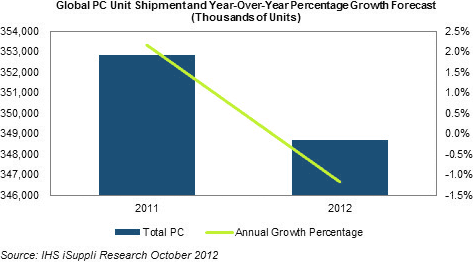
"There was great hope through the first half that 2012 would prove
to be a rebound year for the PC market," says Craig Stice, senior
principal analyst for computer systems at IHS. "Now three quarters
through the year, the usual boost from the back-to-school season
appears to be a bust, and both AMD and Intel's third-quarter outlooks
appear to be flat to down. Optimism has vanished and turned to doubt,
and the industry is now training its sights on 2013 to deliver the
hoped-for rebound. All this is setting the PC market up for its first
annual decline since the dot-com bust year of 2001".
Hope Turns to Disappointment
The year started off with major hope for Intel's Ultrabooks at the
annual Consumer Electronic Show (CES) in Las Vegas. New and innovative
form factors like convertibles, combined with the first appearance of
Windows 8 demos on display, provided a fresh wave of enthusiasm for the
possibility of a revitalized PC market. Even when first-quarter PC
shipments came in, the less-than-stellar results were thought to be a
minor setback.
The high expectations continued midyear during the big PC event at
Computex in Taiwan, as Intel plugged its latest Ivy Bridge processor.
Shipments during the second quarter, however, once again
disappointed.
For now, important questions remain for the PC market and the rest
of the year:
- How much impact will Windows 8 really have toward boosting the PC
market in the fourth quarter?
- Will continuing global economic concerns neutralize whatever hype
or interest has been generated by Ultrabooks?
- Will mobile computing gadgets such as tablets and smartphones win
over PCs during the crucial holiday selling season, taking precious
consumer dollars and keeping PC sales at bay?
There are signs that a strong rebound could still occur in 2013.
While IHS has reduced its forecast for them, the new Ultrabooks and
other ultrathin notebook computers remain viable products with the
potential to redraw the PC landscape, and the addition of Windows 8 to
the mix could prove potent and irresistible to consumers. Whether a
newly configured PC space could then stand up to the powerful
smartphone and tablet markets, however, remains to be seen, IHS iSuppli
analysts warn.
Link:
PC Shipments Set to Decline in 2012 for First Time in 11 Years
Gartner: Worldwide PC Shipments Declined 8%
in Third Quarter of 2012 as the Market Prepared for Windows 8
PR: Worldwide PC shipments totaled 87.5 million units in the
third quarter of 2012, a decline of 8.3% compared with the third
quarter of 2011, according to preliminary results released this week by
Gartner, Inc.
"A continuing slowdown in consumer PC shipments played a big part in
the overall PC market decline," says Mikako Kitagawa, principal analyst
at Gartner. "The third quarter was also a transitional quarter before
Microsoft's Windows 8 operating system release, so shipments were less
vigorous as vendors and their channel partners liquidated
inventory."
"Retailers were conservative in placing orders as they responded to
weak back-to-school sales. By the end of September, retailers were
focused on clearing out inventory in advance of the Windows 8 launch
later this month," Ms. Kitagawa continues. "On the professional side,
there was minimum impact from Windows 8 in the quarter because the
professional market will not adopt Windows 8 PCs immediately after the
release."
Lenovo has overtaken HP for No. 1 position in worldwide PC shipments
for the first time in the company's history in Q3/2012, as its share
increased to 15.7%, while HP's global PC share was at 15.5% (see Table
1). In addition to acquiring other vendors, Lenovo has also taken an
aggressive position on pricing, especially in the professional market.
As a result, Lenovo has achieved significant market share gains over
the last two years, exceeding regional average growth rates across all
regions.
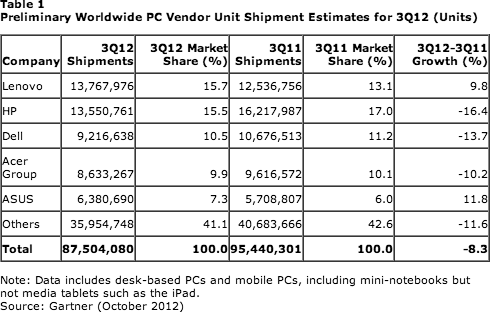
Although it finished the quarter very close to Lenovo, HP
relinquished the top PC vendor position for the first time since the
third quarter of 2006. HP is currently restructuring its device
business, including PCs, tablets and printers, its main concern
currently to achieve a good balance between market share gain and
margin protection.
Dell was Number 3 vendor in PC shipments worldwide in the third
quarter of 2012. While Dell suffered a steeper shipment decline than
the worldwide average, it was less impacted by the upcoming release of
Windows 8 because of its strong focus in the professional market. Dell
continues to gradually transform itself from a PC/device supplier to a
solution provider.
In the US, PC shipments totaled 15.3 million units in the third
quarter of 2012, a 13.8% decline compared with the same period last
year.
"The third quarter has historically been driven by back-to-school
sales, but US PC shipments did not increase, not even sequentially,
from the second quarter of 2012. Channels were conservative in placing
orders," Ms. Kitagawa says. "Professional PC shipments in the US began
slowing in the second quarter of this year, and they continued the
trend in the third quarter. The results indicate that the replacement
peak may have passed in the professional sector."
Four of the top 5 vendors in the US market experienced shipment
declines. HP maintained the No. 1 position in the US market despite a
shipment decline of 19.3% (see Table 2). Lenovo was the only vendor
among the top 5 to increase shipments. Both Acer and Toshiba shipments
declined significantly due to the tough environment in the consumer
market. Even Apple expected to have a PC shipment decline due to
softness in the public market, but the company faced a slowdown in the
consumer market.
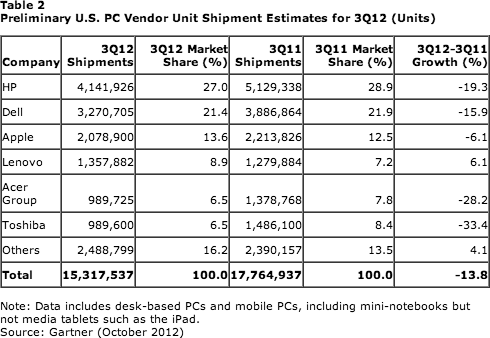
From a regional perspective, PC shipments in Europe/Middle East/Asia
(EMEA) totaled 25.8 million units in the third quarter of 2012, a
decline of 8.7% from the same quarter last year. After two quarters of
positive growth in the first half of 2012, the EMEA market experienced
its biggest decline in four years. The lack of appeal and innovation in
PCs combined with a challenging economic environment diverted user
spending elsewhere. Western Europe saw very weak shipments across all
countries, as retailers reduced Windows 7 inventory in anticipation of
Windows 8 products.
In Asia/Pacific, PC shipments reached 31.3 million units in the
third quarter of 2012, a 5.6% decline from the third quarter of 2011.
Weak demand was brought about as potential buyers chose to reign in or
delay their purchases. China's slowing economy was more acutely felt in
the region in the third quarter, creating an even more conservative
approach to spending. Although there were government PC initiatives in
India and China to drive PC sales, they failed to offset the general
market weakness.
Preliminary results show PC shipments in Latin America surpassed 9.7
million units in the third quarter of 2012, a 6.2% decline from the
same period last year. Mobile PC shipments were flat, and desk-based PC
shipments declined 14.3%. Brazilian businesses and schools may postpone
their IT purchasing due to the expected "Brasil Maior" tax incentives
that were announced late in the quarter. The tax incentives will begin
in 2013, and this is when Gartner expects IT investments to drive PC
shipments into the professional segment.
In Japan, PC shipments totaled 3.7 million units in the third
quarter, a 5.4% decline from the third quarter of 2011. The
professional segment grew slightly higher than expected, but the market
was impacted by the consumer segment. Most of the major vendors did not
introduce new models of mainstream products in September due to the
preparation for Windows 8.
These results are preliminary. Final statistics will be available
soon to clients of Gartner's PC Quarterly Statistics Worldwide by
Region program. This program offers a comprehensive and timely picture
of the worldwide PC market, allowing product planning, distribution,
marketing and sales organizations to keep abreast of key issues and
their future implications around the globe.
Link: Gartner Says Worldwide
PC Shipments Declined 8 Percent in Third Quarter of 2012 as the Market
Prepares for the Launch of Windows 8
Desktop Mac
Deals
Low End Mac updates the following price trackers monthly:
For deals on current and discontinued 'Books, see our 13" MacBook and MacBook Pro,
MacBook Air, 13" MacBook Pro, 15" MacBook Pro, 17" MacBook Pro, 12" PowerBook G4, 15" PowerBook G4, 17" PowerBook G4, titanium PowerBook G4,
iBook G4, PowerBook G3, and iBook G3 deals.
We also track iPad,
iPhone, iPod touch, iPod classic, iPod nano, and iPod shuffle deals.

 "With the Mac
mini still waiting for an update to Intel's latest Ivy Bridge chips,
supply of the diminutive desktop has begun to dwindle at various
resellers....
"With the Mac
mini still waiting for an update to Intel's latest Ivy Bridge chips,
supply of the diminutive desktop has begun to dwindle at various
resellers.... netkas.org
forum contributor Shinso has posted a detailed tutorial on upgrading
older Mac mini firmware in order to support up to 4 GB of RAM
instead of what appears to be an arbitrary 2 GB ceiling imposed by
Apple. Upgrading the firmware should also enable these older minis to
run
netkas.org
forum contributor Shinso has posted a detailed tutorial on upgrading
older Mac mini firmware in order to support up to 4 GB of RAM
instead of what appears to be an arbitrary 2 GB ceiling imposed by
Apple. Upgrading the firmware should also enable these older minis to
run  Motley Fool
blogger Malcolm Manness says he's been an Apple fan for many years, and
a Mac user since
Motley Fool
blogger Malcolm Manness says he's been an Apple fan for many years, and
a Mac user since 



